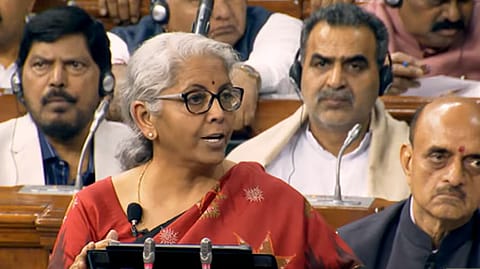Nirmala Sitharaman's New Income Tax Bill: A historic overhaul to rewrite India’s tax future, say experts
Finance Minister Nirmala Sitharaman tables the Income Tax Bill, 2025, which aims to simplify tax laws, enhancing clarity. Experts say it is a serious attempt to simplify and remove ambiguity

Finance Minister Nirmala Sitharaman today tabled the much-anticipated Income Tax Bill, 2025, in the Lok Sabha, marking a decisive break from the Income Tax Act of 1961. Slated to take effect from April 1, 2026, the draft bill has been hailed by tax experts and industry leaders as a landmark reform, designed to modernise India’s tax framework, eliminate ambiguity, and enhance clarity.
The bill proposes a streamlined structure, slashing the number of chapters and sections while retaining the existing tax rates and structure.
Among its most significant features is the reorganisation of major tax exemptions into distinct schedules, an effort aimed at reducing complexity and making compliance more transparent. It also incorporates provisions to address new-age financial realities, including digital transactions, cryptocurrency, and online gaming—sectors that have grown exponentially in recent years.
A new tax era? Experts weigh in
Anil Talreja, Partner at Deloitte India, sees the bill as a "golden opportunity" to make India a more attractive investment destination. “This modernised tax system is aligned with the government’s broader economic vision. It will empower businesses, support the aspirations of India’s middle class, and fuel consumption-driven growth,” he says.
Gouri Puri, Partner at Shardul Amarchand Mangaldas & Co., notes that while the bill doesn’t introduce sweeping policy shifts, it makes crucial structural improvements. “The introduction of a single ‘tax year’ concept, replacing the ‘assessment year’ framework, brings India in line with international tax norms and enhances clarity,” she explains.
For Rohinton Sidhwa, Partner at Deloitte India, one of the biggest takeaways is the bill’s cleaner, more intuitive structure. “By removing convoluted provisos and explanations, the bill makes tax provisions more digestible. The new ‘interpretation’ section defining key terms and the use of tables to present information are significant improvements in readability,” he says.
Recommended Stories
The digital revolution’s imprint on the bill is hard to miss, notes Lokesh Shah, Partner at IndusLaw. “The word ‘digital’ appears 47 times in the bill, underscoring the growing importance of digitalisation in record-keeping, transactions, and compliance. This is a clear recognition of how rapidly India’s economy is shifting online, from cryptocurrencies to e-commerce.”
Online gaming, deep restructuring, and a focus on simplification
A particularly notable addition is the explicit recognition of online gaming as a distinct industry, a move welcomed by the sector. “With clear definitions for new-age growth industries, such as online gaming—which is already four times the size of the global movie and music industries combined—this bill signals an intent to stay ahead of evolving markets,” says Amrit Kiran Singh, President of the Skill Online Games Institute (SOGI).
Himanshu Sinha & Aditi Goyal, Partners at Trilegal’s Tax Practice, highlight the bill’s effort to make tax law less intimidating. “This bill eliminates redundant provisions and simplifies legal language, making it easier to interpret. For example, tax deduction at source (TDS) provisions, which were scattered across 35+ sections in the old act, are now consolidated into just two clauses.”
(INR CR)
A striking aspect of the new framework is its drastic reduction in size. “The new bill contains 2.56 lakh words—almost 50% fewer than the half a million words in the old IT Act. The 911 sections of the 1961 law have been compressed into 536 clauses, eliminating over 300 obsolete provisions,” explains Naveen Wadhwa, Vice President at Taxmann.
Despite its sweeping restructuring, the bill does not impose any additional tax burden on taxpayers. Munjal Almoula, Head of Tax & Regulatory Services at BDO India, underscores that the bill "guides the taxability of new-age income streams like digital assets but does not introduce new taxes.”
A balancing act between reform and continuity
While the Income Tax Bill, 2025, represents a major step towards a more contemporary and efficient tax system, it is still in its draft stage, and deliberations will shape its final form. But if early reactions are anything to go by, this could be the most significant tax overhaul in six decades, setting the stage for India’s transition into a digital-first, investor-friendly economy.